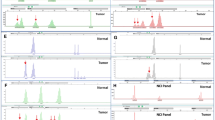Abstract
Background
Fusobacterium nucleatum (F. nucleatum) infection may lead to colorectal cancer (CRC) development in the context of microsatellite instability (MSI). To date, however, the relationship between F. nucleatum load and MSI CRC subtypes has not been clarified.
Methods
One hundred seventy-nine consecutive patients with CRC were enrolled in the present study. In 94 patients with MSI CRC, 32 had hereditary MSI CRC from Lynch syndrome, 62 had sporadic MSI CRC, while the remaining 85 had microsatellite stable (MSS) CRC. The association of the F. nucleatum load with each CRC subtype and the patients’ clinicopathological characteristics was examined.
Results
Of the 179 patients with CRC, 158 (88.3%) were F. nucleatum-positive. A high F. nucleatum load was found in 84.4% (27/32), 96.8% (60/62), and 83.5% (71/85) of the patients with hereditary MSI CRC, sporadic MSI CRC, and MSS CRC, respectively (P = 0.024). In terms of clinicopathological features, a high F. nucleatum load was significantly associated with female, right-sided CRC, BRAF V600E, CpG island methylator phenotype-positive CRC, and MSI CRC (P = 0.008, P = 0.015, P = 0.007, P = 0.006, and P < 0.001, respectively). However, the clinicopathological characteristics did not differ significantly by F. nucleatum load between hereditary and sporadic MSI CRCs without tumor depth.
Conclusions
The F. nucleatum load was higher in hereditary MSI CRC than in MSS CRC as well as sporadic MSI CRC. These findings may contribute to preventing CRC in hereditary MSI CRC through appropriate intervention.



Similar content being viewed by others
References
Network NCC Genetic/Familial high-risk assessment: colorectal (Version 1.2021). https://www.nccn.org/professionals/physician_gls/pdf/genetics_colon.pdf.
Brennan CA, Garrett WS (2016) Gut microbiota, inflammation, and colorectal cancer. Annu Rev Microbiol 70:395–411
Cani PD (2018) Human gut microbiome: hopes, threats and promises. Gut 67:1716–1725
Dai Z, Coker OO, Nakatsu G et al (2018) Multi-cohort analysis of colorectal cancer metagenome identified altered bacteria across populations and universal bacterial markers. Microbiome 6:70
Mima K, Sukawa Y, Nishihara R et al (2015) Fusobacterium nucleatum and T Cells in colorectal carcinoma. JAMA Oncol 1:653–661
Nosho K, Sukawa Y, Adachi Y et al (2016) Association of Fusobacterium nucleatum with immunity and molecular alterations in colorectal cancer. World J Gastroenterol 22:557–566
Natsume S, Yamaguchi T, Takao M et al (2018) Clinicopathological and molecular differences between right-sided and left-sided colorectal cancer in Japanese patients. Jpn J Clin Oncol 48:609–618
Ogino S, Kawasaki T, Brahmandam M et al (2006) Precision and performance characteristics of bisulfite conversion and real-time PCR (MethyLight) for quantitative DNA methylation analysis. J Mol Diagn 8:209–217
Mima K, Nishihara R, Qian ZR et al (2016) Fusobacterium nucleatum in colorectal carcinoma tissue and patient prognosis. Gut 65:1973–1980
Mima K, Cao Y, Chan AT et al (2016) Fusobacterium nucleatum in colorectal carcinoma tissue according to tumor location. Clin Transl Gastroenterol 7:e200
Yamaoka Y, Suehiro Y, Hashimoto S et al (2018) Fusobacterium nucleatum as a prognostic marker of colorectal cancer in a Japanese population. J Gastroenterol 53:517–524
Koi M, Okita Y, Carethers JM (2018) Fusobacterium nucleatum infection in colorectal cancer: linking inflammation, DNA mismatch repair and genetic and epigenetic alterations. J Anus Rectum Colon 2:37–46
Coxhead JM, Williams EA, Mathers JC (2005) DNA mismatch repair status may influence anti-neoplastic effects of butyrate. Biochem Soc Trans 33:728–729
Pande M, Lynch PM, Hopper JL et al (2010) Smoking and colorectal cancer in Lynch syndrome: results from the colon cancer family registry and the university of Texas M.D Anderson cancer center. Clin Cancer Res 16:1331–1339
Dashti SG, Buchanan DD, Jayasekara H et al (2017) Alcohol consumption and the risk of colorectal cancer for mismatch repair gene mutation carriers. Cancer Epidemiol Biomarkers Prev 26:366–375
Dashti SG, Win AK, Hardikar SS et al (2018) Physical activity and the risk of colorectal cancer in Lynch syndrome. Int J Cancer 143:2250–2260
Bullman S, Pedamallu CS, Sicinska E et al (2017) Analysis of Fusobacterium persistence and antibiotic response in colorectal cancer. Science 358:1443–1448
André T, Shiu KK, Kim TW et al (2020) Pembrolizumab in microsatellite-instability-high advanced colorectal cancer. N Engl J Med 383:2207–2218
Lenz HJ, Van Cutsem E, Luisa Limon M et al (2021) First-Line nivolumab plus low-dose ipilimumab for microsatellite instability-high/mismatch repair-deficient metastatic colorectal cancer: the phase II Check Mate 142 study. J Clin Oncol. https://doi.org/10.1200/jco.21.01015.Jco2101015
Antoniotti C, Borelli B, Rossini D et al (2020) AtezoTRIBE: a randomised phase II study of FOLFOXIRI plus bevacizumab alone or in combination with atezolizumab as initial therapy for patients with unresectable metastatic colorectal cancer. BMC Cancer 20:683
Tabernero J, Yoshino T, Cohn AL et al (2019) Open-label phase II/III study of nivolumab plus standard of care versus standard of care for first-line treatment of metastatic colorectal cancer: Checkmate-9X8. J Clin Oncol 37:TPS718
Acknowledgements
We are grateful to all the patients and their families for their participation in this study and would like to thank Mr. James R. Valera for his assistance in editing this manuscript.
Funding
This study was supported by the Office of Metropolitan Hospital Management of the Tokyo Metropolitan Government.
Author information
Authors and Affiliations
Corresponding author
Ethics declarations
Conflict of interest
All the authors have no conflict of interest to declare.
Ethical approval
The study was approved by the institutional review board of our hospital (#1433, #1616 and #2273), and was conducted in accordance with the ethical standards described in the 1964 Declaration of Helsinki and its later amendments.
Additional information
Publisher's Note
Springer Nature remains neutral with regard to jurisdictional claims in published maps and institutional affiliations.
About this article
Cite this article
Ono, T., Yamaguchi, T., Takao, M. et al. Fusobacterium nucleatum load in MSI colorectal cancer subtypes. Int J Clin Oncol 27, 1580–1588 (2022). https://doi.org/10.1007/s10147-022-02218-5
Received:
Accepted:
Published:
Issue Date:
DOI: https://doi.org/10.1007/s10147-022-02218-5




